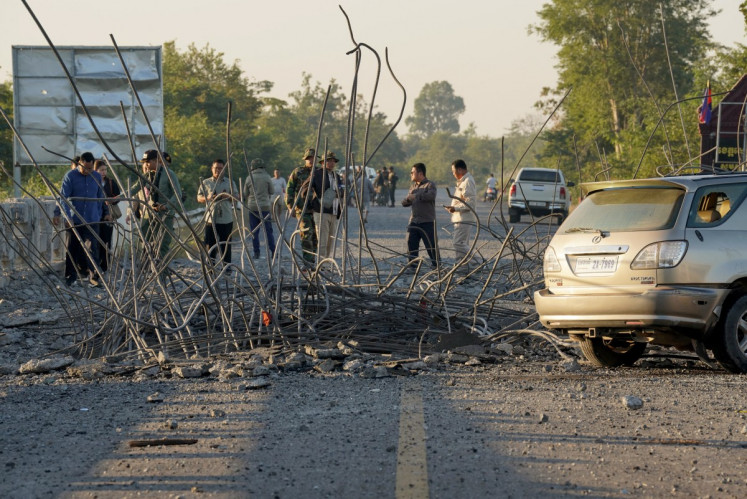Popular Reads
Top Results
Can't find what you're looking for?
View all search resultsPopular Reads
Top Results
Can't find what you're looking for?
View all search resultsIs the FAO award another controversy?
After the controversy of the World Statesman Award given to Indonesian President Susilo Bambang Yudhoyono in late May, a new controversy relating to another award has arisen
Change text size
Gift Premium Articles
to Anyone
A
fter the controversy of the World Statesman Award given to Indonesian President Susilo Bambang Yudhoyono in late May, a new controversy relating to another award has arisen.
Coordinating Economic Minister Hatta Rajasa received an award on behalf of the country from the Food and Agriculture Organization (FAO) in Rome last week in recognition of the government's success in battling hunger and malnutrition.
The awards have given a boost to national pride, but we citizens should respond critically to international accolades because of the public debate surrounding the awards.
Indonesia received the FAO award conferred by the UN body's director general José Graziano da Silva, together with 37 other countries, for its achievements in reaching one of the Millennium Development Goals (MDGs), which is to eradicate poverty and hunger as well as achieving the World Food Summit (WFS) mandate, which is to halve the absolute undernourished population.
Indonesia and its ASEAN neighbors Cambodia, Thailand and Vietnam are entitled to the award, but given the situation in the field, we need to question if the country has already achieved food security.
In 1996, the WFS introduced an important definition that food security existed when all people at all times had access to sufficient, safe, nutritious food to maintain healthy and active lives. Since then, the FAO has also introduced three pillars that are often used to assess food security: namely food availability, food accessibility and food use/utility. In fact, since the emergence of high fluctuations in food prices, some studies focusing on food security included an additional pillar called 'food stability'.
The four pillars serve as a critical assessment of Indonesia's eligibility for the FAO award.
In the wake of the food crisis in 2008, in particular during 2010-2012, the availability of food in Indonesia was alarming, especially in the five agricultural commodities of rice, sugar, soybean, corn and beef. In fact, the Agriculture Ministry set its sights on food self-sufficiency in those five commodities in 2014.
Based on data obtained from the United Nations Commodity Trade Statistics Database (UN COMTRADE), during 2010-2012, Indonesia relied on imports of those five commodities. The country also depended on imports from ASEAN countries in three important commodities: rice, soybean and beef. This condition was exacerbated by the policies of the Trade Ministry and Agriculture Ministry, which banned the importation of several horticultural products since the beginning of 2013 with the issuance of Agricultural Regulation No. 60/2012 on the recommendation of horticulture imports and the Trade Minister Regulation No. 60/2012 on the import of horticultural products.
In terms of accessibility, geographical handicaps and the development gap remain challenges that Indonesia cannot yet cope with. The poor quality of roads and bridges, road congestion, disintegrated railways and costly and inefficient means of transportation connecting islands remain a classic problem characterizing Indonesia.
Although the National Logistics System (Sislognas) and the Masterplan for the Acceleration and Expansion of Indonesian Economic Development (MP3EI) have been launched to improve the access to and distribution of development across Indonesia, no significant results have yet emerged.
In terms of utility, the concept of food diversification some ministers have been promoting through electronic and mass media has in general shown quite significant progress. However, food is not only an economic commodity, but is also a socioeconomic or cultural element that has a major role in determining people's behavior in consuming food.
Peter Atkins and Ian Bowler (2005) in their book Food in Society: Economy, Culture and Geography, which was also developed from the thoughts of John McKenzie (1979), assert three important factors that influence people's choice in consuming food: geo-environmental, socioeconomic and psychological factors.
Meanwhile, in terms of stability, Indonesia is still relatively weak in stabilizing food prices. The country has seen scarcity and skyrocketing prices of food commodities like chili, beef, soybean and garlic within the last six months.
Therefore, food availability and the stability of food prices have a very close relationship. The horticulture import ban imposed by the government has also exacerbated the stability of food prices in Indonesia, because imports are supposed to maintain the stability of food prices. The distortion that occurs in those four pillars of food security has impacted greatly on the level of poverty and hunger in Indonesia.
From the discussion of the four pillars, we can ask ourselves whether the FAO award should have been given to the government or not. Does the award automatically show that food security in Indonesia has been achieved or does it only give rise to another controversy? This is a very difficult question because there are still many problems that the country needs to tackle, especially in the field of food security.
Christian Anton Smedshaug (2010) in his book Feeding the World in the 21st Century: A Historical Analysis of Agriculture and Society, underlines that reform of the three basic elements is very important in order to improve the efficiency and effectiveness of food security policy making, such as structural reform, developmental reform and social reform.
In conclusion, Indonesia deserves such an award only if the government already recognizes the concept of food security, such as a famine early warning system, which has been well institutionalized. In addition, food security should be kept from the interference of irresponsible parties who just want to take advantage for certain personal or group interests.
The writer is a researcher in the department of economics at the Centre for Strategic and International Studies (CSIS), Jakarta.










